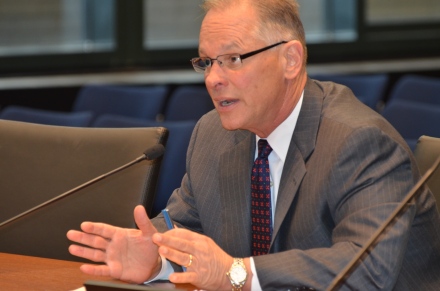
TASC Executive Vice President Peter Palanca testifies before the Illinois House Task Force on Heroin Crisis (photo: David Ormsby)
(Chicago) – A top TASC official, a local prosecutor, and health experts sent a clear message to lawmakers at an Illinois House heroin hearing this week: prevention and treatment funding are a priority.
The new House Task Force on Heroin Crisis held its first hearing in Chicago on Tuesday and took testimony from health and criminal justice experts, including TASC Executive Vice President Peter Palanca.
House task force members present at the hearing – State Reps. Lou Lang (D-Skokie), who chairs the panel, Patricia Bellock (R-Hinsdale), Dan Brady (R-Bloomington), Mary Flowers (D-Chicago), Esther Golar (D-Chicago), and Chris Welch (D-Hillside) – heard witnesses testify on multiple dimensions of Illinois’ heroin crisis. In addition to treatment and prevention funding, testifiers highlighted the science of addiction, describing it as a “medical disease,” and cited the law enforcement challenge of stopping illegal drug sales happening by way of pre-paid mobile phones that lack owner identification.
DuPage County Coroner Dr. Richard Jorgensen, a former emergency room surgeon, explained to legislators the medical impact of heroin on the brain and stressed how the drug’s purity has intensified. He also issued an alarm about the over-prescription of opiate painkillers.
Of those who become addicted to heroin, he said, “Most people become addicted through prescription drugs, and then turn to heroin because it’s cheaper.”
Additionally, Jorgensen emphasized that heroin use is a medical issue, not a criminal justice issue.
“You can’t criminalize your way out of this epidemic,” said Jorgensen. “I really believe that all the prevention dollars that you put in come back many times over.”
TASC’s Palanca bluntly told the committee that solutions are well known and need to be implemented. “The solutions aren’t rocket science and they need to be brought to scale,” said Palanca. “Those solutions include use of proven medications, evidence-based treatment, and prevention.”
Lang told Palanca that the task force plans on leaning on his organization’s expertise.
“We know because of the history of your fine organization that you have a lot to offer us,” said Lang.
Dr. Joseph Troiani, director of Behavioral Health Programs for the Will County Health Department, pointed to the heavy budget cuts inflicted on Illinois’ drug prevention and treatment programs, noting that prevention funding has been cut 88% and drug treatment more than 40% since 2009.
Troiani also stressed that Medicaid expansion under the Affordable Care Act provides an opportunity to expand treatment services, but warned that the issue of capacity – building facilities – needs to be addressed, saying that capital funding for bricks and mortar is critical.
Following testimony by Dr. Seth Eisenberg, medical director for the Illinois Department of Human Services’ Division of Alcoholism and Substance Abuse, Lang asked Eisenberg to “provide to this committee your ideal budget. We know there’s been a cut. What would it take?”
Also testifying at the hearing were Will County State’s Attorney James Glasgow, Cook County State’s Attorney’s Narcotics Prosecution Bureau Chief Brian Sexton, and April Marin and Cassandra Wingert, family members of heroin overdose victims.
Marin testified that her 20-year-old son, whom she suspects was trying heroin for the first time, had typed into Google just days before he died from an overdose, “How much heroin can you safely snort?”
Marin has made it her mission to promote intervention, education, and prevention, entreating legislators for their support.